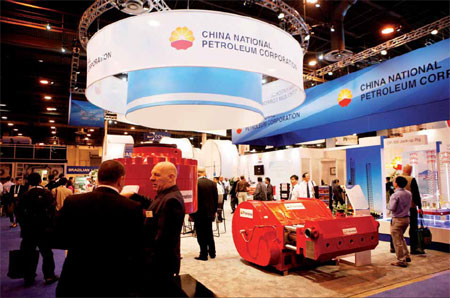Call for oil monopoly to be broken up
Updated: 2013-10-25 09:59
By Bao Chang (China Daily Europe)
|
|||||||||||
Foreign and private companies step up activities in retail trade
China should set up an independent company to operate the oil wholesale business and manage the supply to retailers, industry experts have suggested. That would break up the de facto monopoly of the three state-owned large oil companies, especially the two onshore oil giants, they say.
Many of China's petrol stations are run by Sinopec Ltd and PetroChina Co Ltd, and although those owned by foreign companies and private investors do exist, they have a marginal significance in terms of market share.
"One way to get fair market competition in petroleum is to change oil retailing by prizing the petrol station business out of the grip of the three main state-owned oil enterprises and setting up another SOE that would run them," says Xu Baoli, director of the research center of the State-owned Assets Supervision and Administration Commission.
This year, China's new leaders have pledged a series of economic reforms to invigorate the economy, dismantling the SOE monopolies in industries including petroleum, telecommunications and finance.
During the World Economic Forum in Dalian, Liaoning province, last month, Premier Li Keqiang said China was now at a crossroads and the country would not achieve sustainable economic growth unless there was structural upgrading and transformation.
In the domestic oil market, the three main state-owned petroleum giants, China National Petroleum Corp, China Petroleum and Chemical Corp and China National Offshore Oil Corp, have dominated the main business areas, including oil and gas exploration, refining and retailing, for many years.
However, foreign and private companies have recently stepped up their expansion into areas that used to be state-dominated.
Guanghui Energy Co Ltd, a private energy company in Xinjiang Uygur autonomous region, has been reported to be planning to work with Royal Dutch Shell plc's operations in China on deepening the liquefied natural gas industrial chain, and they are expected to sign a deal within a few months.
Guanghui Energy is now building a natural gas distribution center in Qidong, Jiangsu province, that will be able to move 5.6 million tons through a pipeline a year.
Industry insiders say that if Guanghui Energy and Shell's Chinese branch can reach an agreement, it will change the monopoly situation in the Chinese energy market.
Guanghui has built about 80 LNG filling stations in Xinjiang and plans to have about 300 by the end of 2015, expanding the businesses to areas outside Xinjiang, such as in Gansu and Shandong provinces.
In 2010 the State Council issued guidelines to encourage healthy private investment, and more private enterprises have entered the oil and gas industry and have been playing a significant role in some areas.
Shell is now the largest international supplier of LNG to China. The company's core businesses in the country include oil and gas exploration and LNG, oil products and chemicals.
Shell also established a joint venture with Shaanxi Yanchang Petroleum (Group) Co Ltd in 2008, aiming to enter the petrol station business in the province.
Shen Hao, chairman of Yanchang, Petroleum, says working with Shell meant not only that both sides could sell oil products but also learn about management and service standards from a foreign partner.
Shell says it runs more than 600 petrol stations in the country.
Xu says he believes that the petrol station business should be made independent from CNPC, Sinopec and CNOOC, and foreign and private investors should be given more encouragement to compete in the market place.
The domestic petrol station market was opened to foreign investors in 2004, but Sinopec and CNPC maintain a strong sway over it, with more than 80 percent of the market.
PetroChina says that at the end of 2011 it had more than 19,000 petrol stations and that Sinopec had more than 30,000.
Private and foreign companies planning to enter the service station sector face some market restrictions. as Petrol station operators are required to have a stable oil supplier.
Those who work with CNPC and Sinopec as their oil suppliers need to provide a supply contract of more than three years to the local government in Chongqing municipality and others are required to have their own oil storage with ample reserves.
"This requirement is a big burden for private petrol station owners," Ye Tan, a financial commentator, wrote in her blog.
Xu Baoli says: "CNPC, Sinopec and CNOOC own the oil exploration franchise so it can't be ruled out that they discriminate against downstream oil refining and retail businesses, taking advantage of their control of the industry upstream. When crude oil production is limited, the big SOEs may reduce supply to other refining companies, hitting their production."
To ensure the safety of non-renewable energy oil, the presence of three national petrol companies in exploration development, which is considered an administrative monopoly, conforms to common international practices, he adds.
Because of huge market demand, China has become a big oil consumer and is estimated to have overtaken the US to become the largest importer.
Last month the gap between oil consumption and domestic production averaged 6.24 million barrels a day in the US, compared with 6.3 million barrels a day in China, the US government's Energy Information Administration says.
But the Chinese government still needs to find ways to further ease market access in oil refining and retailing to offset the influence of the exploration monopoly, Xu says.
Kang Yan, a senior partner at Roland Berger Strategy Consultants (Shanghai), says Shell Oil Co has been striving to expand its petrol station network in China in its efforts to broaden its global presence.
"This represents Shell's decision for long-term development in China," Kang said.
Shell operates its independent-branded petrol stations in China through acquisition and lease deals. In addition, the company has jointly set up hundreds of petrol stations with Sinopec.
More competition in the industry would be beneficial because oil prices would fall once competition was running at full tilt and service at petrol stations would improve, Kang says.
"If all the petrol station retailers, State-run, foreign and private, could sell the finished-oil products explored by CNPC, Sinopec and CNOOC, a competitive tendency would be formed among the three oil majors in the finished oil market. Each would choose quality oil products at low prices," Xu says.
In the same year, for the first time, six private enterprises were included in the national oil strategic storage system.
The rise in Chinese demand has driven up oil prices globally, making North American shale production economically viable and suppressing US consumption, the Financial Times reported. In addition, Chinese buyers can have a stronger influence on the payment terms to smaller oil producers.
Du Juan contributed to this story.
baochang@chinadaily.com.cn
|
As part of the efforts to dismantle the monopoly in the petroleum sector, experts said China should separate the oil wholesale business from the three major state-owned enterprises. Provided to China Daily |
(China Daily European Weekly 10/25/2013 page14)
Today's Top News
Mythbuster dispels fictions about China
Forum urges stableChina-Japan ties
NSA spying hurts US diplomacy
Carrier rocket sent to launch base for moon landing
Requirements cut for business startups
Study shows PM1 most harmful
Cold snap to sweep NE, N China
Paper apologizes for reporter's untrue stories
Hot Topics
Lunar probe , China growth forecasts, Emission rules get tougher, China seen through 'colored lens', International board,
Editor's Picks

|

|

|

|

|

|






